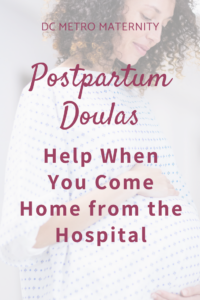One of the most challenging features of the first year of a baby’s life, how fast everything changes. If no one has warned you yet, the first big change comes quickly- on the day you come home from the hospital. When you walk through those hospital doors into the sunlight, suddenly you’re completely in charge of an infant.
Most of the time, while new parents are in the hospital, they’re taken care of. And it’s hard to tell while they’re happening, but in comparison to what’s coming, those moments might feel dreamy in hindsight.
In the hospital postpartum floor, there’s always someone to help.
For better or worse, you’re never alone.
The nurses will teach you to bathe the baby, or do it for you. The pediatricians or OBs come by to reassure you that the baby is doing well. A lactation professional assists with feeding the baby. More than likely you’re given a schedule so that things seem somewhat predictable. There are receiving blankets, onesies, hats and pacifiers. Half dozen people are happy to teach you to swaddle your newborn.
But usually, on the third or fourth day (depending on if you had a vaginal or cesarean birth) you go home from the hospital.
It’s not that no one gives you instructions. When you’re sent home from the hospital, you’re usually given charts to keep track of the diapers, and the baby’s feeding schedule. There are discharge papers for you after birth, and the baby. Then at your first appointment for the baby, the pediatrician gives you more papers.
But these papers seem to treat your baby as though they’re an equation to be solved. It’s as if when you put in x amount of food, you’ll get y hours of a satisfied baby. Instead, your newborn is a tiny human that changes constantly.
And while there are books on baby’s development, four days postpartum isn’t your peak reading time.
That first day is hard. And maybe the next few are as well.
But just because you’re from the hospital (who’d think that a postpartum ward could be a cocoon, right?) doesn’t mean that you have to go it alone.
In fact, we don’t believe that you’re supposed to do this alone. And so as postpartum and infant care doulas, we’re there to fill in the gaps that the hospital nurses and sometimes even family can’t fill.
You can have us by your side through these moments that feel impossible.

When we’re your birth doulas, we check on you within those first few days of arriving home from the hospital. And we focus on postpartum doula support because we know just how many changes you can expect.
We know that babies seem to suddenly notice that they’re in the outside world as soon as you’re the adult solely responsible for them. And we know that they want to cry about it.
We know that your breastmilk switches from colostrum to mature milk right around now, so on top of your postpartum bleeding and the baby’s tears, you might be swollen, engorged or leaking. And hormonal. You’re definitely hormonal.
We know that there’s a time around 2 weeks when your milk supply changes again, a time around three weeks when babies seem like jerks. Then there’s a time at three months where you can’t use the swaddle anymore and your baby may not sleep much.
We expect that your baby will keep changing after you come home from the hospital. Your family’s needs will change with it.
So let us escort you through your entire first year. More than labor support, we believe that your village should include judgment-free, knowledgeable support as your baby grows.
Want to know more about postpartum and infant care doula support? Let’s talk!


